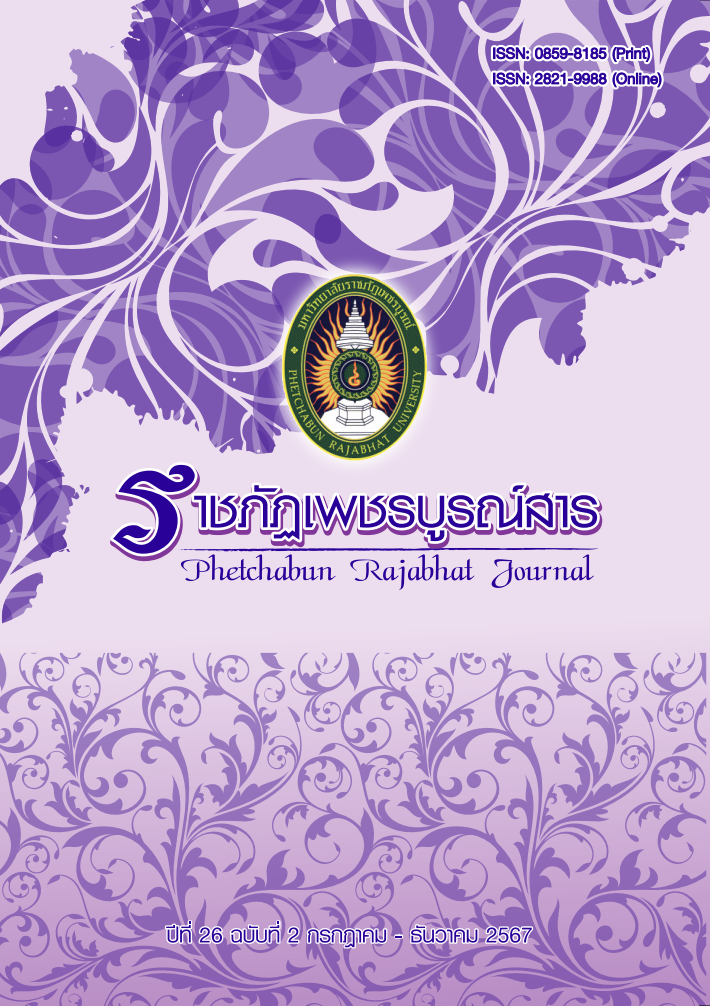แนวทางการแก้ไขปัญหาภาคสนามในการดำเนินการสัมภาษณ์เพื่อการวิจัยเชิงคุณภาพ: แนวทางปฏิบัติสำหรับนักวิจัยใหม่
Main Article Content
บทคัดย่อ
บทความวิชาการฉบับนี้มีวัตถุประสงค์ที่จะนำเสนอปัญหาและแนวทางการแก้ไขปัญหาภาคสนามในการดำเนินการสัมภาษณ์เพื่อการวิจัยเชิงคุณภาพ การศึกษาดำเนินการโดยการทบทวนวรรณกรรมที่เกี่ยวข้องแล้วนำมาสกัดข้อมูลเพื่อใช้เป็นฐานในการเขียนบทความนี้ขอบเขตของการศึกษาประกอบด้วย 1. บทนำ 2. การทบทวน 3. สรุปผลการศึกษา 4. ความรู้ใหม่ที่ได้จากการศึกษา 5. ข้อเสนอแนะ ผลการศึกษา พบว่า องค์ประกอบสำคัญของการสัมภาษณ์ ประกอบด้วย 9 องค์ประกอบ คือ 1. นักวิจัย 2. ผู้ให้ข้อมูล 3. ระเบียบวิธีการวิจัย 4. เครื่องมือการวิจัย 5. สถานที่การวิจัย 6. จริยธรรมการวิจัย 7. วัฒนธรรมเกี่ยวกับการวิจัย 8. ข้อมูลการวิจัย 9. ผลการวิจัยที่คาดหวังการสัมภาษณ์ แบ่งได้ 3 ประเภทหลัก คือ 1. การสัมภาษณ์แบบไม่มีโครงสร้าง 2. การสัมภาษณ์แบบกึ่งโครงสร้าง และ 3. การสัมภาษณ์แบบมีโครงสร้าง วิธีการสัมภาษณ์ ประกอบด้วย 4 วิธี คือ 1. วิธีการสัมภาษณ์แบบตัวต่อตัว 2. วิธีการสัมภาษณ์โดยการสนทนากลุ่ม 3. วิธีการสัมภาษณ์ทางโทรศัพท์ 4. วิธีการสัมภาษณ์แบบใช้ออนไลน์ แอพพลิเคชั่น ปัญหาภาคสนามและแนวทางแก้ไขในการสัมภาษณ์ คือ 1. ปัญหาที่อาจเกิดขึ้นด้านเอกสารและเครื่องมือที่ใช้ในการสัมภาษณ์ 2. ปัญหาที่อาจเกิดขึ้นด้านการเข้าถึงผู้ให้ข้อมูลและสถานที่สัมภาษณ์ 3. ปัญหาที่อาจเกิดขึ้นจากตัวผู้ให้ข้อมูลผู้ให้สัมภาษณ์ 4. ปัญหาที่อาจเกิดขึ้นจากตัวนักวิจัยผู้สัมภาษณ์ 5. ปัญหาที่อาจเกิดขึ้นจากสภาพแวดล้อม จากการศึกษาครั้งนี้คณะผู้ศึกษาได้นำเสนอประเด็นปัญหาและแนวทางแก้ไขปัญหาภาคสนามที่นักวิจัยผู้สัมภาษณ์โดยเฉพาะอย่างยิ่งนักวิจัยใหม่หรือนักวิจัยที่ปรับเปลี่ยนกระบวนทัศน์จากเดิมมาเป็นนักวิจัยเชิงคุณภาพสามารถนำไปใช้เป็นแนวทางในการดำเนินการสัมภาษณ์ในการวิจัยเชิงคุณภาพต่อไป
Article Details

อนุญาตภายใต้เงื่อนไข Creative Commons Attribution-NonCommercial-NoDerivatives 4.0 International License.
เนื้อหาและข้อมูลในบทความที่ลงตีพิมพ์ในวารสาร ถือเป็นข้อคิดเห็นและความรับผิดชอบของผู้เขียนบทความโดยตรง ซึ่งกองบรรณาธิการวารสารไม่จำเป็นต้องเห็นด้วย หรือร่วมรับผิดชอบใด ๆ
เอกสารอ้างอิง
จำเนียร จวงตระกูล. (2553). การวิจัยเชิงคุณภาพ: เครื่องมือสร้างองค์ความรู้เพื่อการพัฒนาประเทศ. กรุงเทพฯ: บริษัท ศูนย์กฎหมายธุรกิจอินเตอร์เนชั่นแนล จำกัด.
จำเนียร จวงตระกูล, นพพงศ์ เกิดเงิน, ตระกูล จิตวัฒนากร และภาวัช ครูซ. (2566). แนวทางการเขียนบทความวิชาการเพื่อตีพิมพ์ในวารสารทางวิชาการสำหรับนักวิชาการใหม่. วารสารวิชาการการตลาดและการจัดการ มหาวิทยาลัยเทคโนโลยีราชมงคลธัญบุรี, 10(1), 1-19.
จำเนียร จวงตระกูล, ศิวะพร ภู่พันธ์, อุทัย อันพิมพ์ และอารี ผสานสินธุวงศ์. (2566). การใช้การวิจัยเชิงคุณภาพยุทธศาสตร์การศึกษาเพื่อสร้างทฤษฎีจากข้อมูลในงานรัฐประศาสนศาสตร์: การทบทวนวรรณกรรมแบบไม่ใช้ระบบ. PAAT Journal, 5(10), 7-34.
จำเนียร จวงตระกูล, กล้าหาญ ณ น่าน และอรรถพล ศิริลัทธยากร. (2566). การนำการวิจัยแบบการทบทวนวรรณกรรมอย่างเป็นระบบไปใช้ในการวิจัยทางรัฐประศาสนศาสตร์ในประเทศไทย. PAAT Journal, 5(9), 1-23.
Alamri, W. A. (2019). Effectiveness of Qualitative Research Methods: Interviews and Diaries. International Journal of English and Cultural Studies, 2(1), 65-70.
Block, E. S. & Erskine, L. (2012). Interviewing by Telephone: Specific Considerations, Opportunities, and Challenges. International Journal of Qualitative Methods, 11(4), 428-445.
Busetto, L., Wick, W. & Gumbinger, C. (2020). How to use and assess qualitative research methods. [Neurological Research and Practice]. https://neurolrespract.biomedcentral.com/counter/pdf/10.1186/s42466-020-00059-z.pdf: retrieved 1 February 2024.
Creswell, J. W. (2009). Research Design: Qualitative, Quantitative, and Mixed Methods Approaches (3rd ed.). Los Angeles: SAGE.
Creswell, J. W. (2014). Research Design: Qualitative, Quantitative, and Mixed Methods Approaches (4th ed.). Los Angeles: SAGE.
De Villiers, C., Farooq, M.B. & Molinari, M. (2021). Qualitative Research Interviews Using Online Video Technology - Challenges and Opportunities, Meditari Accountancy Research, forthcoming. https://doi.org/10.1108/MEDAR-03-2021-1252.
Dhillon, P. (2022) How to write a good scientific review article. The FEBS Journal, 289, 3592-3602.
Drabble, L., Trocki K. F., Salcedo, B., Walker, P. C. & Korcha, R. A. (2016). Conducting qualitative interviews by telephone: Lessons learned from a study of alcohol use among sexual minority and heterosexual women. Qual Soc Work, 15(1), 118-133.
Dunwoodie, K., Macaulay, L. & Newman, A. (2023).Qualitative interviewing in the field of work and organisational psychology: Benefits, challenges and guidelines for researchers and reviewers. Applied Psychology, 72(2023), 863–889.
Dursun, B., (2023). A Qualitative Research Technique: Interview. Journal of Interdisciplinary Educational Research, 7(14), 100-113.
Elhami, A. & Khoshnevisan, B. (2022). Conducting an Interview in Qualitative Research: The Modus Operandi. MEXTESOL Journal, 46(1), 1-7.
Engward, H., Goldspink, S., Iancu, M., Kersey, T., & Wood, A. (2022). Togetherness in Separation: Practical Considerations for Doing Remote Qualitative Interviews Ethically. International Journal of Qualitative Methods, 21. https://journals.sagepub.com/doi/epub/10.1177/16094069211073212.
Enoch, J., Subramanian, A. & Willig, C. (2023). “If I don’t like it, I’ll just pop the phone down!”: Reflecting on participant and researcher experiences of telephone interviews conducted during the COVID-19 pandemic. SSM - Qualitative Research in Health, 4(2023), 1-10.
Ferrari, R. (2015). Writing narrative style literature reviews. Medical Writing, 24(4), 230-235.
Frey, T. K. & Bloch, B. S. (2023). Using Microsoft Teams to Facilitate Asynchronous Online Focus Groups. International Journal of Qualitative Methods, 22. https://journals.sagepub.com/doi/epub/10.1177/16094069231211251.
Green, B. N., Johnson, C. D. & Adams, A. (2006). Writing narrative literature reviews for peer-reviewed journals: secrets of the trade. JOURNAL OF CHIROPRACTIC MEDICINE, 5(3), 101-117.
Huelin, R., Iheanacho, I., Payne, K. & Sandman, K. (2015). What’s in a Name? Systematic and Non-Systematic Literature Reviews, and Why the Distinction Matters. THE EVIDENCE FORUM May 2015. https://www.evidera.com/wp-content/uploads/2015/06/Whats-in-a-Name-Systematic-and-Non-Systematic-Literature-Reviews-and-Why-the-Distinction-Matters.pdf.
Keen, S., Lomeli-Rodriguez, M. & Joffe, H. (2022). From Challenge to Opportunity: Virtual Qualitative Research During COVID-19 and Beyond. Int J Qual Methods, 4(21). https://www.ncbi.nlm.nih.gov/pmc/articles/PMC9167989/.
Khan, T. & MacEachen, E. (2022). An Alternative Method of Interviewing: Critical Reflections on Videoconference Interviews for Qualitative Data Collection. International Journal of Qualitative Methods, 21. https://journals.sagepub.com/doi/epub/10.1177/16094069221090063.
Kitchenham, B., Brereton, O. P., Budgen, D., Turner, M., Bailey, J. & Linkman, S. (2009). Systematic literature reviews in software engineering – A systematic literature review. Information and Software Technology, 51, 7–15.
Kvale, S. (1996). InterViews: An Introduction to Qualitative Research Interviewing. Thousand Oaks: Sage.
Mengista, W., Soromessa, T. & Legese, G. (2020). Method for conducting systematic literature review and metaanalysis for environmental science research. MethodsX 7, 100777. https://shorturl.asia/HJ7Vg.
Mwita, M.K. (2022). Factors to consider when using qualitative interviews in data collection. Social Sciences, Humanities and Education Journal (SHE Journal), 3(3), 313-323.
Opdenakker, R. J. G. (2006). Advantages and disadvantages of four interview techniques in qualitative research. Forum Qualitative Sozialforschung = Forum : Qualitative Social Research, 7(4), art.11. https://pure.tue.nl/ws/portalfiles/portal/1948695/Metis202565.pdf.
Patton, M., Q. (1990). Qualitative Evaluation and Research Methods (2nd ed.). Newbury Park, California: Sage.
Rahman, A., Zulkifle, M., Aslam, M. & Khan, M. R. (2019). Components of Writing a Review Article. Journal of Integrated Community Health, 8(1–2019), 8-12.
Ryan, F., Coughlan, M. & Cronin, P. (2009). Interviewing in qualitative research: The one-to-one interview. International Journal of Therapy and Rehabilitation, 16(6), 309-314.
Sah, L. K., Singh, D. R., Sah, R. K. (2020). Conducting Qualitative Interviews using Virtual Communication Tools amid COVID-19 Pandemic: A Learning Opportunity for Future Research. JNMA J Nepal Med Assoc, 58(232), 1103-1106.
Snyder, H. (2019). Literature review as a research methodology: An overview and guidelines. Journal of Business Research, 104, 333–339.
Taherdoost, H. (2022). How to Conduct an Effective Interview; A Guide to Interview Design in Research Study Authors. International Journal of Academic Research in Management (IJARM), 11(1), 39-51.
Xiao, Y. & Watson, M. (2019). Guidance on Conducting a Systematic Literature Review. Journal of Planning Education and Research, 39(1), 93–112.


